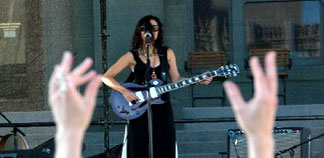به زبان فارسی
PICTORY
LATEST MUSIC
SEARCH
HEJAB
STORY
UP OR DOWN
STORY
MEMORIES
ACCOUNTABILITY
POETRY
صد ها نخ سیگار
در لابلای انگشتان تو
خاموش مانده است
و دودشان در دل من به آهی بدل.
>>>
IRAN-ISRAEL
ANSWERS
IDEAS
POETRY
غذای سوخته می دهد
آبجوی خوبی ندارد
صندلی هایش مرا لق می کنند
خرده های شکر روی میزهایش
تراشیده از مجسمه قهرمانی است ناکام >>>
MISSING
FEATURED BLOGS
The New Iranian.com Is Ready!
by SaidAmin on 12/05/2012 - 08:32 (39 comments)
ادا اطوار اسلامی
ادا اطوار اسلامی
by Fred on 12/05/2012 - 01:25 (5 comments)
مسجد همجنسگرایان
مسجد همجنسگرایان
by Fred on 12/05/2012 - 00:00 (one comment)
ROYAL PREGNANCY: Prince William, Duchess of Cambridge Announce Pregnancy
by Darius Kadivar on 12/04/2012 - 23:55 (3 comments)
Taking Back the Streets: Iranian Graffiti Artists Negotiating Public Space
by ajammc on 12/04/2012 - 15:26
که خوش میآمد آن بورانی اسفناج
که خوش میآمد آن بورانی اسفناج
by Red Wine on 12/04/2012 - 15:05 (4 comments)
پیروزی نسرین ستوده پس از ٤٩ روز اعتصاب غذا
پیروزی نسرین ستوده پس از ٤٩ روز اعتصاب غذا
by Azadeh Azad on 12/04/2012 - 11:11 (32 comments)
اشعاری به یاد محمد مختاری شاعر و نویسنده ی مقتول ایران
اشعاری به یاد محمد مختاری شاعر و نویسنده ی مقتول ایران
by All-Iranians on 12/04/2012 - 10:14 (11 comments)
A Conversation between a Bahai and a former member of Hojjatieh Association
by Tapesh on 12/04/2012 - 05:18 (2 comments)
Iranians are legitimate target
by Fred on 12/04/2012 - 04:43 (10 comments)
Ashraful Makhlookaat!!! Gods imperfect 'Prime Creation.'
by Iqbal Latif on 12/04/2012 - 04:36 (3 comments)
Power of Crowd Funding for dental care professionals
by rbnfl on 12/03/2012 - 23:00 (8 comments)
خاطرات خانه زندگان (قسمت هفتم).
خاطرات خانه زندگان (قسمت هفتم).
by همنشین بهار on 12/03/2012 - 20:56
Ayatollahs are building their new Shiite Kingdom
by alimostofi on 12/03/2012 - 16:52 (4 comments)
Iranian Azerbaijani soccer fans take off their clothes in sympathy with earthquake victims
by Savalan on 12/03/2012 - 15:50 (7 comments)
Astrology of 2012 Galactic Alignment on 21st December 2012 or Shabe-Yalda.
by alimostofi on 12/03/2012 - 14:34
Persian parties are like Persian history!
by Esfand Aashena on 12/03/2012 - 07:01 (34 comments)
DESPERATE HOUSEWIVES: Golshifteh Farahani & Sienna Miller in Road Movie ‘Just Like a Woman »
by Darius Kadivar on 12/03/2012 - 05:24
احسان نراقی؛ همراه ۲ رژیم متضاد
احسان نراقی؛ همراه ۲ رژیم متضاد
by Fred on 12/03/2012 - 04:13 (7 comments)
Defining 'infinity' with our 'finite minds.' We live in-between two infinities!
by Iqbal Latif on 12/03/2012 - 04:09 (14 comments)
"This is Not a Film" & "The Patience Stone," full-length films
by maghshoosh on 12/03/2012 - 03:30 (one comment)
Asrrology of Sun in Azar or Sagittarius and Moon in Amordad or Leo 2012.
by alimostofi on 12/03/2012 - 01:58 (2 comments)
RECENT COMMENTS
FEATURED NEWS
Madam President with lachak
کوفت و زهر مار ایرانی!
بعد از 49 روز
Hussein's drones accounted for
Face Lift at Parchin!
Uncle Hussein's eyes & ears
Erasing traces of women in pre-Islamic Iran
Sotoudeh's body cannot hold fluids any longer
Toying with Saeed's life
وقاحت
IRANIANS OF THE DAY
| Person | About | Day |
|---|---|---|
| نسرین ستوده: زندانی روز | Dec 04 | |
| Saeed Malekpour: Prisoner of the day | Lawyer says death sentence suspended | Dec 03 |
| Majid Tavakoli: Prisoner of the day | Iterview with mother | Dec 02 |
| احسان نراقی: جامعه شناس و نویسنده ۱۳۰۵-۱۳۹۱ | Dec 02 | |
| Nasrin Sotoudeh: Prisoner of the day | 46 days on hunger strike | Dec 01 |
| Nasrin Sotoudeh: Graffiti | In Barcelona | Nov 30 |
| گوهر عشقی: مادر ستار بهشتی | Nov 30 | |
| Abdollah Momeni: Prisoner of the day | Activist denied leave and family visits for 1.5 years | Nov 30 |
| محمد کلالی: یکی از حمله کنندگان به سفارت ایران در برلین | Nov 29 | |
| Habibollah Golparipour: Prisoner of the day | Kurdish Activist on Death Row | Nov 28 |























